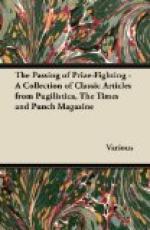* * * * *
“The first annual dinner
of the —— Club was held in the Club
Rooms on Saturday evening, a large number sitting
down to an
excellent coal collation.”—Local
Paper.
Surely a little extravagant in these times.
=The poet laureate and his German friends.=
“Prisoners to a foe inhuman,
Oh, but our hearts rebel;
Defenceless victims ye are, in claws of spite a
prey.
* * * * *
Nor trouble we just Heaven that quick revenge be
done
On Satan’s chamberlains highseated in Berlin;
Their reek floats round the world on all lands neath
the sun:
Tho’ in craven Germany was no man found, not
one
With spirit enough to cry Shame!—Nay
but on such sin
Follows Perdition eternal ... and it has begun.”
The POET LAUREATE, in “The Times,” November 4th, 1918.
“The letter [of reconciliation from Oxford Professors, etc., ’to their fellows in Germany’] is written ... with the recognition that we have both of us been provoked to ‘animosities’ which we desire to put aside ... The commonest objection was that the action was ’premature’—my own feeling being that of shame for having vainly waited so long in deference to political complications, and that shame was intolerably increasing ... It is undiscerning not to see that at a critical moment of extreme tension they [the German Professors] allowed their passion to get the better of them.”
The POET LAUREATE, in “The Times,” October 27th, 1920.
[The author of the following
lines fears that he has failed to
do full justice to the metrical
purity of the Master’s
craftsmanship.]
Such people as lacked the leisure to peruse
My scripture, one-and-a-quarter
columns long
In The Times, may like
me, as having the gift of song,
To prosodise succinctly my private views.
Did I cry Shame! in November, 1918,
On those who never cried Shame!
on the lords of hell?
Rather the shame is mine who delayed to
clean
My soul of a wrong that grew
intolerable.
What if our German colleagues, our brothers-in-lore,
Preached and approved for
years the vilest of deeds?
Yet is there every excuse
when the hot blood speeds;
We too were vexed and wanted our fellows’
gore,
Saying rude things in a moment of extreme
tension
Which in our calmer hours we should never
mention.
Dons in their academic ignorance blind,
With passions like to our
own as pea to pea,
Shall we await in them a change of mind?
Shall we require a repentant
apology?
Or in a generous spasm anticipate
The regrets unspoken that,
under the heavy stress
Of labour involved in planning
new frightfulness,
They have been too busy, poor dears, to
formulate?




